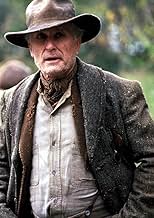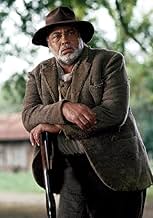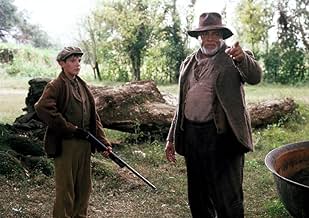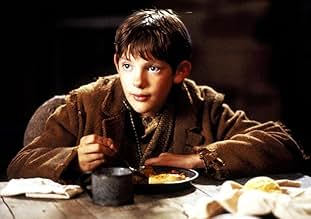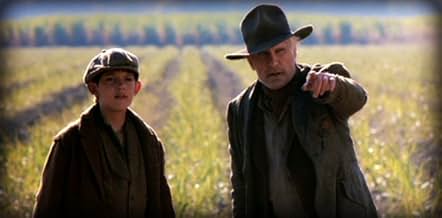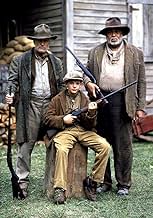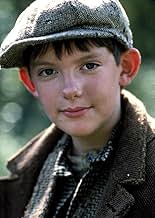Añade un argumento en tu idiomaHorton Foote's story of a teen-aged boy in the Depression who finds work on an eccentric's sugar plantation and learns life's surprising lessons from the team of convicts who also work there... Leer todoHorton Foote's story of a teen-aged boy in the Depression who finds work on an eccentric's sugar plantation and learns life's surprising lessons from the team of convicts who also work there.Horton Foote's story of a teen-aged boy in the Depression who finds work on an eccentric's sugar plantation and learns life's surprising lessons from the team of convicts who also work there.
Bob Edmundson
- Overseer
- (as Robert Edmundson)
Reseñas destacadas
Along with Robert DeNiro and Al Pacino, Robert Duvall brings to the screen the best film acting of our generation. Unlike the other two, he can shape a "typical" role into something original and unique. Through emotional shadings and nuance, Duvall has created a remarkable gallery of Southern characters, each individualized despite having many surface traits in common. Surely DeNiro and Pacino are highly skilled actors, but the best performances of each resemble one another to a fault. Duvall has made his share of potboilers and worse, yet his most substantial roles have generated performances of singular quality.
One of them is in "Convicts." The others? Don't miss "The Apostle," "Rambling Rose," "Tender Mercies," "Stars Fell on Henrietta," and "Tomorrow."
One of them is in "Convicts." The others? Don't miss "The Apostle," "Rambling Rose," "Tender Mercies," "Stars Fell on Henrietta," and "Tomorrow."
Robert Duvall gives a creditable performance as the supervisor of a convict farm in 1902 Texas who befriends a young boy (Lukas Haas). The screenplay, written by Horton Foote, contrasts the difficulties of growing up and growing old. Duvall's character is senile and suffering ill health. He alienates himself from family and associates - except for a former convict assigned to his charge, the young boy who reminds him of his youth, and a couple who live in the village store.
It's a nice set piece, and the warm colors create a real feeling of turn-of-the-century South. While Duvall's character could have been fleshed out more, he does an excellent job as a man intent on dying on his own terms with help from his young charge
It's a nice set piece, and the warm colors create a real feeling of turn-of-the-century South. While Duvall's character could have been fleshed out more, he does an excellent job as a man intent on dying on his own terms with help from his young charge
Like many stage adaptations, this film is a collection of set pieces without a tight overarching narrative. Not only is it adapted from the stage, but from the middle of a three-act play, which serves to remove some of the context; the viewer is just plopped into the middle of this one.
I thought the performances were good overall, but the production was somewhat lacking. Perhaps the streaming version I saw was a bad transfer, but the cinematography was nothing to write home about, the contrast was way too high in many of the daylight scenes, and the colors looked as if the film was shot on old, faded film stock.
A bit of a strange soundtrack too, but I liked it and I thought it was fitting.
I would recommend it if you like Foote, Faulkner, or Duvall.
I thought the performances were good overall, but the production was somewhat lacking. Perhaps the streaming version I saw was a bad transfer, but the cinematography was nothing to write home about, the contrast was way too high in many of the daylight scenes, and the colors looked as if the film was shot on old, faded film stock.
A bit of a strange soundtrack too, but I liked it and I thought it was fitting.
I would recommend it if you like Foote, Faulkner, or Duvall.
If you care for fine acting and excellent characterization, try this film. It doesn't take the commercial, slick, easy approach to the storyline about the reason for use of convict labor on Southern plantations, or about the treatment of the convicts unlucky enough to be doing time at hard labor. Filled with well-thought-out glimpses of the declining southern gentry, the economics of plantation ownership, racism, and other tough subjects, it is also a commentary on human fragility.
My review was written in November 1991 after watching the film at a Manhattan screening room.
Robert Duval adds another memorable character to his screen portfolio in Horton Foote's "Convicts", a static, uncinematic play to film adaptation. Despite good supporting turns, the feature is strictly for Foote fetishists.
Given Duvall's stature and his quality work here it makes sense that 18 months-on-the-shelf pic is getting an Oscar qualifying run. Financial problems of its distributor MCEG account for the tardy release.
Foote has provided Duvall with some of his best screen roles, including the Faulkner adaptation "Tomorrow" and "Tender Mercies". Simpatico "Convicts" team also includes director Peter Masterson, who acted in "Tomorrow" and directed Foote's "The Trip to Bountiful"; and producer Sterling Van Wagenen, who made his directorial debut several months after this picture with "Convicts" co-star Lukas Haas starring in "Alan & Naomi". And Haas re-teamed a bit larger with Duvall to great effect in "Rambling Rose".
Unfortunately "Convicts", the second play in a nine-play cycle Foote calls "The Orphan's Home", does not present the sort of material suitable for modern film audiences. It might have worked best in the special interest format of Ely Landau's "American Film Theater" adaptations of the early 1970s.
Set on Texas's Gulf Coast on Christmas Eve in 1902 (actually lensed on Louisiana locations), "Convicts" is told through the observations of 13-year-old Haas, working in a country store on Duvall's sugar cane plantation. Many year's back, the land's tenant farmers were dismissed and convicts were contracted for low-cost labor replacements -not unlike the original slavery system.
Civil War veteran Duvall runs the farm but is senile, his affliction allowing Foote to out-Pinter Harold Pinter in dialog repetition. Duvall's interpretation is dead-on, as he continually asks Haas and anyone else in earshot the same inane questions to ultimately yield comic relief.
Presented without much continuity in elliptical vignettes, the story does not have a cumulative, dramatic narrative. Instead, various forms of cryptic behaviors are observed via Haas' eyes. Haas is trying to earn enough money to buy a headstone for his late father's unmarked grave and Duvall, making accelerating promises of wealth to Haas, gradually takes the boy under his wing.
The convicts of the title die of overwork or are shot to death 'escaping' almost randomly, with director Masterson emphasizing their symbolic function in the story by not explaining why. Duvall is so absentmnded he keeps asking if a specific convict is a Negro, and hnas to be reminded that they all are.
All the adult white people in the cast are constantly drunk, including Duvall's relatives Carlin Glynn and Gary Swanson, who loll around the house aimlessly. Foote's portrait of a decadent society on its last legs will not please Southerners but is vividly realized in microcosm here.
Haas, as in "Rambling Rose", provides impressive naturalism to balance Duvall's barnstorming performance. James Earl Jones is also quite understated, and besides Mel Winkler's convincing period portrayal, there is a powerfully modern, almost militant turn by Calvin Levels as a convict in chains who tells his sad story to Haas.
Toyomichi Kurita's frequently backlit photography captures the atmosphere of the place but the location shooting fails to disguise the story's theatrical origins.
Robert Duval adds another memorable character to his screen portfolio in Horton Foote's "Convicts", a static, uncinematic play to film adaptation. Despite good supporting turns, the feature is strictly for Foote fetishists.
Given Duvall's stature and his quality work here it makes sense that 18 months-on-the-shelf pic is getting an Oscar qualifying run. Financial problems of its distributor MCEG account for the tardy release.
Foote has provided Duvall with some of his best screen roles, including the Faulkner adaptation "Tomorrow" and "Tender Mercies". Simpatico "Convicts" team also includes director Peter Masterson, who acted in "Tomorrow" and directed Foote's "The Trip to Bountiful"; and producer Sterling Van Wagenen, who made his directorial debut several months after this picture with "Convicts" co-star Lukas Haas starring in "Alan & Naomi". And Haas re-teamed a bit larger with Duvall to great effect in "Rambling Rose".
Unfortunately "Convicts", the second play in a nine-play cycle Foote calls "The Orphan's Home", does not present the sort of material suitable for modern film audiences. It might have worked best in the special interest format of Ely Landau's "American Film Theater" adaptations of the early 1970s.
Set on Texas's Gulf Coast on Christmas Eve in 1902 (actually lensed on Louisiana locations), "Convicts" is told through the observations of 13-year-old Haas, working in a country store on Duvall's sugar cane plantation. Many year's back, the land's tenant farmers were dismissed and convicts were contracted for low-cost labor replacements -not unlike the original slavery system.
Civil War veteran Duvall runs the farm but is senile, his affliction allowing Foote to out-Pinter Harold Pinter in dialog repetition. Duvall's interpretation is dead-on, as he continually asks Haas and anyone else in earshot the same inane questions to ultimately yield comic relief.
Presented without much continuity in elliptical vignettes, the story does not have a cumulative, dramatic narrative. Instead, various forms of cryptic behaviors are observed via Haas' eyes. Haas is trying to earn enough money to buy a headstone for his late father's unmarked grave and Duvall, making accelerating promises of wealth to Haas, gradually takes the boy under his wing.
The convicts of the title die of overwork or are shot to death 'escaping' almost randomly, with director Masterson emphasizing their symbolic function in the story by not explaining why. Duvall is so absentmnded he keeps asking if a specific convict is a Negro, and hnas to be reminded that they all are.
All the adult white people in the cast are constantly drunk, including Duvall's relatives Carlin Glynn and Gary Swanson, who loll around the house aimlessly. Foote's portrait of a decadent society on its last legs will not please Southerners but is vividly realized in microcosm here.
Haas, as in "Rambling Rose", provides impressive naturalism to balance Duvall's barnstorming performance. James Earl Jones is also quite understated, and besides Mel Winkler's convincing period portrayal, there is a powerfully modern, almost militant turn by Calvin Levels as a convict in chains who tells his sad story to Haas.
Toyomichi Kurita's frequently backlit photography captures the atmosphere of the place but the location shooting fails to disguise the story's theatrical origins.
¿Sabías que...?
- PifiasWhen Soll thinks he hears someone in the closet he shoots three times and we see three bullet holes. But when Jackson opens the closet door to investigate, there are four holes.
- Citas
Horace Robedaux: Martha, are you afraid of dying?
Martha Johnson: No, I ain't afraid. Just not ready to go yet.
- Banda sonoraGolden Slippers
Sung by Jackson
Selecciones populares
Inicia sesión para calificar y añadir a tu lista para recibir recomendaciones personalizadas
- How long is Convicts?Con tecnología de Alexa
Detalles
Taquilla
- Recaudación en Estados Unidos y Canadá
- 13.623 US$
- Fin de semana de estreno en EE. UU. y Canadá
- 6347 US$
- 8 dic 1991
- Recaudación en todo el mundo
- 13.623 US$
Contribuir a esta página
Sugerir un cambio o añadir el contenido que falta

Principal laguna de datos
By what name was Convictos (1991) officially released in India in English?
Responde
